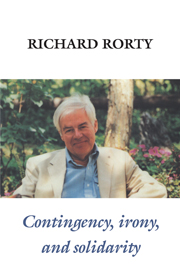5 - Self-creation and affiliation: Proust, Nietzsche, and Heidegger
Published online by Cambridge University Press: 05 June 2012
Summary
To illustrate my claim that, for us ironists, theory has become a means to private perfection rather than to human solidarity, I shall discuss some paradigms of ironist theory: the young Hegel, Nietzsche, Heidegger, and Derrida. I shall use the word “theorist” rather than “philosopher” because the etymology of “theory” gives me the connotations I want, and avoids some I do not want. The people I shall be discussing do not think that there is anything called “wisdom” in any sense of the term which Plato would have recognized. So the term “lover of wisdom” seems inappropriate. But theoria suggests taking a view of a large stretch of territory from a considerable distance, and this is just what the people I shall be discussing do. They all specialize in standing back from, and taking a large view of, what Heidegger called the “tradition of Western metaphysics” – what I have been calling the “Plato–Kant canon.”
The items in this canon, the works of the great metaphysicians, are the classic attempts to see everything steadily and see it whole. The metaphysicians attempt to rise above the plurality of appearances in the hope that, seen from the heights, an unexpected unity will become evident – a unity which is a sign that something real has been glimpsed, something which stands behind the appearances and produces them. By contrast, the ironist canon I want to discuss is a series of attempts to look back on the attempts of the metaphysicians to rise to these heights, and to see the unity which underlies the plurality of these attempts.
- Type
- Chapter
- Information
- Contingency, Irony, and Solidarity , pp. 96 - 121Publisher: Cambridge University PressPrint publication year: 1989
- 3
- Cited by



